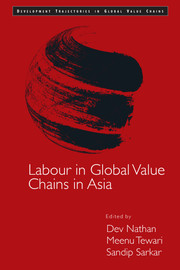Book contents
- Frontmatter
- Contents
- Figures
- Tables
- Foreword
- Preface
- Acknowledgements
- Introduction
- Captive Governance
- 2 Achieving Better Work for Apparel Workers in Asia
- 3 Improving Wages and Working Conditions in the Bangladesh Garment Sector: The Role of Horizontal and Vertical Relations
- 4 Bargaining in Garment GVCs: The Asia Floor Wage
- 5 Fresh Produce Markets, Standards, and Dynamics of Labour: Grapes in India
- 6 The ‘Zero-Fee’ Tour: Price Competition and Chain Downgrading in Chinese Tourism
- 7 Restricting Competition to Reduce Poverty: Impact of the Tourism Value Chain in an Upland Economy in China
- 8 Restructuring of Post-crisis GVCs: Tourism in Bali, Indonesia
- 9 Dynamics of Labour-intensive Clusters in China: Wage Costs and Moving Inland
- 10 Migrant Labour in Global Value Chains in Asia
- Modular Governance
- Relational Governance
- Conclusions
- Notes on Contributors
- Index
7 - Restricting Competition to Reduce Poverty: Impact of the Tourism Value Chain in an Upland Economy in China
from Captive Governance
Published online by Cambridge University Press: 23 July 2017
- Frontmatter
- Contents
- Figures
- Tables
- Foreword
- Preface
- Acknowledgements
- Introduction
- Captive Governance
- 2 Achieving Better Work for Apparel Workers in Asia
- 3 Improving Wages and Working Conditions in the Bangladesh Garment Sector: The Role of Horizontal and Vertical Relations
- 4 Bargaining in Garment GVCs: The Asia Floor Wage
- 5 Fresh Produce Markets, Standards, and Dynamics of Labour: Grapes in India
- 6 The ‘Zero-Fee’ Tour: Price Competition and Chain Downgrading in Chinese Tourism
- 7 Restricting Competition to Reduce Poverty: Impact of the Tourism Value Chain in an Upland Economy in China
- 8 Restructuring of Post-crisis GVCs: Tourism in Bali, Indonesia
- 9 Dynamics of Labour-intensive Clusters in China: Wage Costs and Moving Inland
- 10 Migrant Labour in Global Value Chains in Asia
- Modular Governance
- Relational Governance
- Conclusions
- Notes on Contributors
- Index
Summary
Introduction
This is a study of the impacts of the tourism value chain on the upland economy of the indigenous people-dominated Lijiang Prefecture in China's Yunnan Province. Our central concern is with poverty reduction and the ways in which this might be brought about by local segments of the tourism value chain. The extent of benefits arising from these local segments of the value chain depends on the ability of local producers and local governments to restrict competition among tourism service suppliers.
The next section sets out the nature of poverty in the uplands, and the constraints facing economic development of the uplands. This is followed by a discussion of the nature of the tourism value chain and the likely local linkages of tourism. The next section summarizes field findings from Lijiang Prefecture and is followed by a discussion of the precarious nature of tourism jobs and the role of competition-reducing organization of producers and state-provided social security in reducing precarity and increasing the positive impact, in terms of reducing poverty.
This paper is based on field investigations over a number of years in villages and the old town of Dayan in Lijiang Prefecture, including recent field trips in March 2011 and 2012. The details of this field work are mentioned in Chapter 6.
Economic constraints and poverty in the uplands
Poverty in China, as in much of Asia, is disproportionately concentrated in the uplands. China's indigenous peoples who live in the uplands made up about 40 per cent of the absolute poor in 2000, though they accounted for less than 9 per cent of the population (Nathan et al., 2012). Generally speaking, the potential for the development of agriculture and industry, i.e., two sectors that are usually considered key production sectors, is narrowly limited in upland economies.
In the case of agriculture, mountain soils are thin, water retention capacity is poor, and there is little irrigation. The one type of agriculture in which the uplands can compete with the plains is in the cultivation of temperate fruits and off-season vegetables, or of resource-specific products, such as the highly valued shitake mushroom, which only grows alongside oak trees.
- Type
- Chapter
- Information
- Labour in Global Value Chains in Asia , pp. 139 - 153Publisher: Cambridge University PressPrint publication year: 2016

